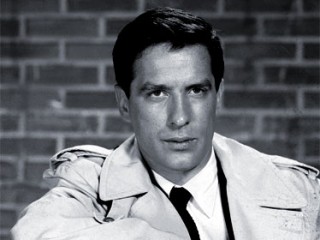
John Cassavetes biography
Date of birth : 1929-12-09
Date of death : 1989-02-03
Birthplace : New York City, New York, US
Nationality : American
Category : Arts and Entertainment
Last modified : 2011-06-25
Credited as : Actor, screenwriter, and filmmaker,
0 votes so far
The son of Greek immigrants, Cassavetes was born December 9, 1929, in New York City. After attending public school on Long Island, he later studied English at both Mohawk College and Colgate University prior to enrolling at the New York Academy of Dramatic Arts. Upon graduating in 1950, he signed on with a Rhode Island stock company while attempting to land roles on Broadway and made his film debut in Gregory Ratoff's Taxi in 1953. A series of television roles followed, with Cassavetes frequently typecast as a troubled youth. By 1955, he was playing similar parts in the movies, appearing in pictures ranging from Night Holds Terror to Crime in the Streets.
Cassavetes' career as a filmmaker began most unexpectedly. In 1957, he was appearing on Night People, a New York-based radio show, to promote his recent performance in the Martin Ritt film Edge of the City. While talking with host Jean Shepherd, Cassavetes abruptly announced that he felt the film was a disappointment and claimed he could make a better movie himself; at the close of the program, he challenged listeners interested in an alternative to Hollywood formulas to send in a dollar or two to fund his aspirations, promising he would make "a movie about people." No one was more surprised than Cassavetes himself when, over the course of the next several days, the radio station received over 2,000 dollars in dollar bills and loose change; true to his word, he began production within the week, despite having no idea exactly what kind of film he wanted to make.
Assembling a group of students from his acting workshop, Cassavetes began work on what was later titled Shadows. The production had no script or professional crew, only rented lights and a 16 mm camera. Without any prior experience behind the camera, Cassavetes and his cast made mistake after mistake, resulting in a soundtrack which rendered the actors' dialogue completely inaudible (consequently creating a three-year delay in release while a new soundtrack was dubbed). A sprawling, wholly improvised piece about a family of black Greenwich Village jazz musicians -- the oldest brother dark-skinned, the younger brother and sister light enough to pass for white -- the film staked out the kind of fringe society to which Cassavetes' work would consistently return, posing difficult questions about love and identity.
Unable to find an American distributor, the completed Shadows appeared in 1960, and was widely hailed as a groundbreaking accomplishment. After receiving the Critics Award at that year's Venice Film Festival, it finally was released in the U.S. with the backing of a British distributor. The film's success brought Cassavetes to the attention of Paramount, who hired him to direct the 1961 drama Too Late Blues with Bobby Darin. The movie was a financial and critical disaster, and he was quickly dropped from his contract. Landing at United Artists, he directed A Child Is Waiting for producer Stanley Kramer. After the two men had a falling out, Cassavetes was removed from the project, which Kramer then drastically re-cut, prompting a bitter Cassavetes to wash his hands of the finished product.
Stung by his experiences as a Hollywood filmmaker, he vowed to thereafter finance and control his own work, turning away from directing for several years to earn the money necessary to fund his endeavors. A string of acting jobs in films ranging from Don Siegel's The Killers to Roman Polanski's Rosemary's Baby to Robert Aldrich's The Dirty Dozen (for which he received an Academy Award nomination for Best Supporting Actor) wrapped up Cassavetes for all of the mid-'60s, but in 1968 he returned to filmmaking with Faces, the first of his pictures to star his wife, the brilliant actress Gena Rowlands. Another edgy drama shot in Cassavetes' trademark cinéma vérité style, Faces was a tremendous financial and critical success, garnering a pair of Oscar nominations as well as winning five awards at the Venice Film Festival; its success again brought Hollywood calling, but this time the director entertained only those offers affording him absolute creative control and final cut.
After coming to terms with Columbia, Cassavetes began work on 1970's Husbands, which co-starred Peter Falk and Ben Gazzara. After helming 1971's Minnie and Moskowitz for Universal, he turned to self-financing, creating his masterpiece A Woman Under the Influence, which earned Rowlands an Academy Award nomination in the Best Actress category. With a story he developed with longtime fan Martin Scorsese, Cassavetes next turned to 1976's film noir The Killing of a Chinese Bookie; though also reissued two years later in a truncated version, the picture failed to find an audience, and was barely even circulated. When the same fate befell 1978's Opening Night, Cassavetes was forced to return to Columbia in 1980 to make Gloria.
Four years passed before the director's next film, Love Streams. His subsequent effort was 1985's aptly titled Big Trouble, a comedy already in production when Cassavetes took over for writer/director Andrew Bergman, who had abruptly quit the project. The finished film was subsequently recut by its producers, and Cassavetes publicly declared it a disaster. Upon completing the picture, he became ill; regardless, he continued working, turning to the theatrical stage when he could no longer find funding for his films. A Woman of Mystery, a three-act play which was his final fully realized work, premiered in Los Angeles in 1987. On February 3, 1989, John Cassavetes died. Son Nick continued in his father's footsteps, working as an actor as well as the director of the films Unhook the Stars (1996) and She's So Lovely (1997), the latter an adaptation of one of his father's unfilmed screenplays.
















